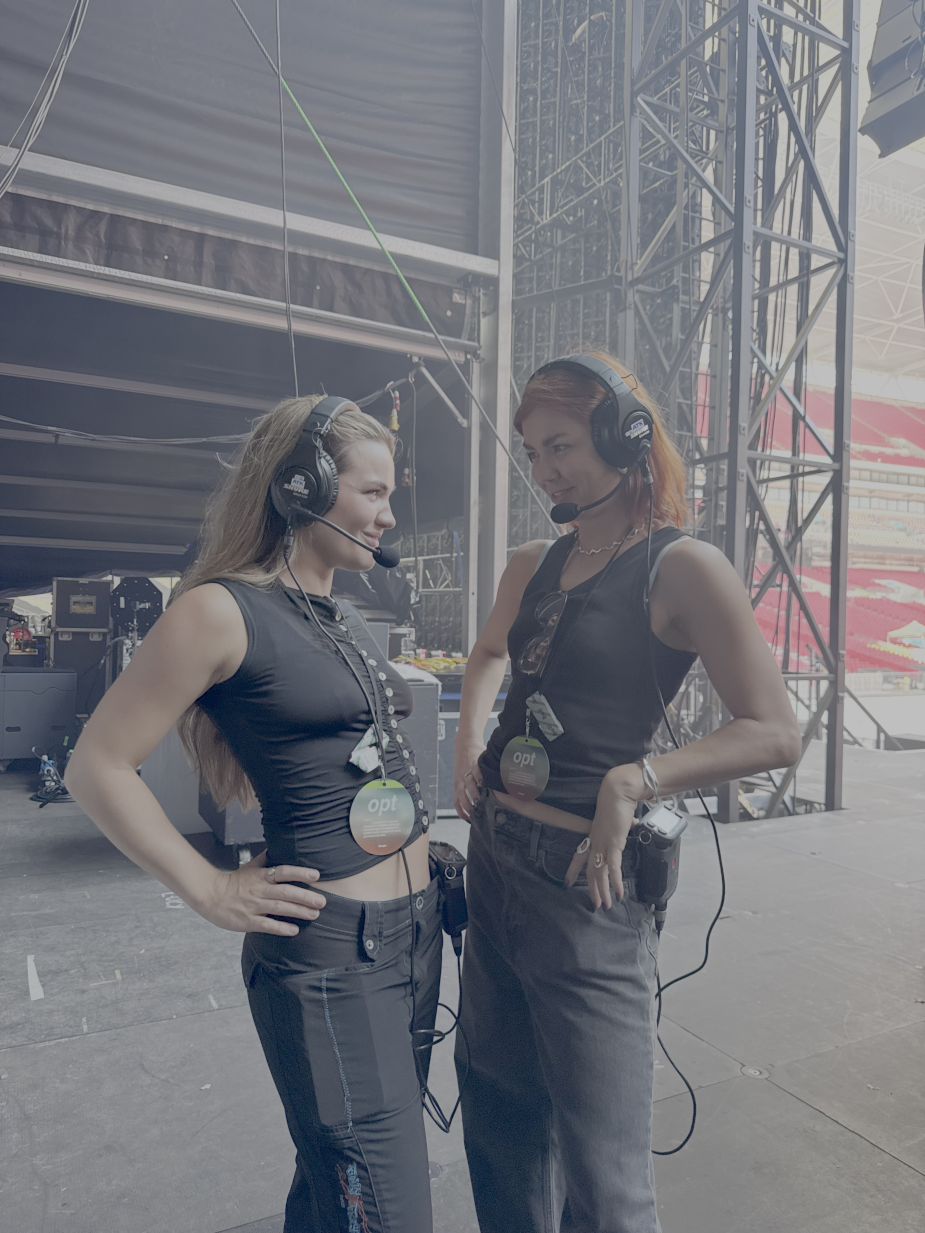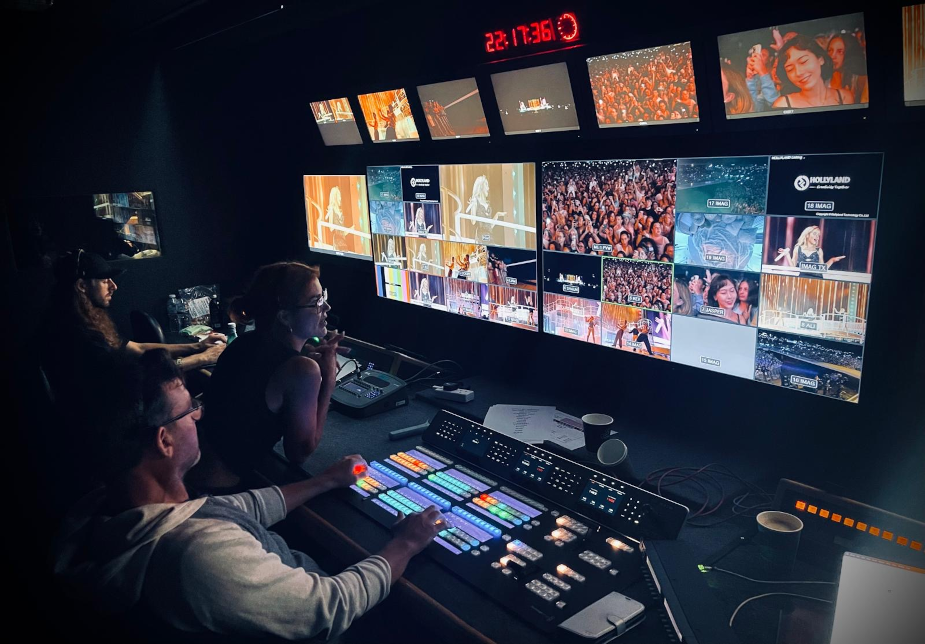
Meet Becky Garner: The Director Taking Over the Live Music Scene

Becky Garner is a London-based director and visual artist celebrated for her inventive approach to commercial campaigns, live shows, and mixed-media storytelling. She has created work for leading global brands such as Samsung, Vogue, ON Running, Missoma, Tinder, Nike, Adidas, Reebok, Hourglass, Ray-Ban, Casablanca, and Barbour, among others.
Her portfolio bridges the worlds of fashion, music, and culture- shaping striking visual narratives for artists including Dua Lipa, Zara Larsson, Khruangbin, FLO, Tom Grennan, Zara Larsson, Cyndi Lauper, Central Cee, and Shygirl. Known for blending motion graphics with cinematic live performance coverage, she crafts content designed to maximise audience engagement across platforms.
Becky’s live direction credits span high-profile multi-camera productions such as Central Cee at The O2 for Apple Music Live, Chase & Status in Milton Keynes, Jacob Collier with Chris Martin at The O2, Sabrina Carpenter at BST, Cyndi Lauper’s Girls Just Want To Have Fun Tour, and BICEP’s CHROMA show at Glastonbury’s IICON stage. She has also worked on standout events including Bicep On The Beach in Brighton and Amazon Music’s City Sessions featuring Ella Henderson.
Q> Let’s go back to the beginning - what first drew you to directing live music, and do you remember the moment you realised this was the path you had to follow?
Becky> There’s something about seeing an artist light up a crowd- no second takes, no edits, just raw, in the moment energy. The first show I ever filmed was a Mac Miller concert. I was underage, snuck in a camera, and had no idea what I was doing. The footage was rough, but it captured something real. At the time, it was just a hobby, but that feeling of documenting something alive stuck with me.
I didn’t realise it then, but growing up in Glastonbury and going to the festival as a kid had already laid the groundwork. Being immersed in that world from such a young age- seeing massive, genre-defining performances up close- naturally pulled me toward live music as a form of storytelling.
Q> Your work blends cinematic storytelling with the raw chaos of live performance — who or what were your biggest creative influences when you first started developing your style?
Becky> Early on, I was really inspired by Jas Davis’s work with Skrillex- it was ahead of its time- fast, expressive, and showed how visuals could turn a set into something way more cinematic and storytelling. I've been lucky enough to work with Zak Norman, where his work had a huge impact on how I think about narrative in a live context. His ability to blend abstract visuals with storytelling really pushed me to develop my own language- something that lives between chaos and control.
More recently, Paul Dugdale’s work has opened my eyes to the creative potential within the live space. His direction is flawless, capturing each moment with such intimacy that it feels like you're in the front row.
Q> The Chase and Status live film at Milton Keynes Bowl was a breakout moment for you — what was the vision behind that project, and how did it evolve once the cameras started rolling?
Becky> That was genuinely the best day of my life after having the worst production call of my life, where I thought I was going to be directing the live to air screens cut on the images.
I’d never been in an ob truck before, didn’t really know what a live multicam director even did. Luckily, I had Amy James, the ultimate boss producer, guiding me through it. But as soon as we started, I hit this flow state. I grew up on Chase & Status, so it just clicked. Multicam directing felt like getting smacked in the face with exactly what I was meant to do. Everything about it made sense.
Q> Working with someone like Dua Lipa is no small feat. What was it like stepping into her world, and how did you collaborate to craft something that felt both elevated and authentic to her?
Becky> My original concept didn’t even involve direct access to Dua - it was centred around her voice notes. But when we met and I shared the idea, she connected with it immediately. It felt fresh and like a genuine way to give back to her fans.
As an artist, Dua was incredible, granting us intimate access to some truly personal moments. Her team made us feel part of the process, which allowed that raw emotion to come through authentically. Huge shoutout to Imran and Tara Bartlett and the team at Lowkey for making it all happen.

Q> You've gone from underground gigs to arena stages — what’s been the biggest adjustment in scaling up your productions without losing your gritty and emotional edge?
Becky> I still try to keep the grit because that’s what makes my work feel like me. The biggest adjustment has been staying level-headed and not letting the scale of arenas overwhelm me. No matter how big the stage, I want to hold on to that raw, emotional edge that connects with people on a real level.
Q> As your profile grows, how do you balance commercial pressure with creative freedom — especially when working with global artists and big teams?
Becky> It’s all about collaboration and building a genuine connection with the artist and team before we start. I love working closely with everyone to understand their unique vision and tailor the approach specifically to them. It's all about trust in this sense. I think I bring a fresh perspective to live.
Q> Is there a particular show or moment in your career so far that perfectly encapsulates who Becky Garner is as a director?
Becky> Deffo Central Cee and Dua!
Working with Central Cee, I listened to his music on repeat to really get into his world. I wanted to create something raw and cinematic that felt true to him. I took risks- like placing cameras where they blocked others- some paid off, some really didn’t, but it was a learning curve. I love to feel a little uncomfortable! Si- Fi productions are in a league of their own, and knowing they’ve worked with some incredible directors, I definitely felt the pressure to deliver.
With Dua, I had so much fun. Being part of that team and getting full access was next level. I want to keep making these kinds of mini-docs- real, honest, and fully embedded. Audiences don’t want polished PR pieces- they want to see who these artists really are.

Q> You’re now seen as one of the most exciting voices in live music direction — what advice would you give to young creatives looking to break into this space and make something unforgettable?
Becky> Stay curious and keep experimenting. Start small, embrace the chaos, and learn from every experience. Building real relationships and collaborating is key.
Be open to learning- I’ve learnt more in the past year than since school. Don’t hesitate to reach out to mentors; their advice has been invaluable to me.
Q> As the demand for your work increases where do your aspirations lead in the coming years?
Becky> I want to keep pushing the limits of live multicam direction with bigger, more ambitious projects that mix innovation, new cameras, unseen locations and emotion. Collaborating with inspiring artists and staying true to my style are key.
I don't just want to focus on the live show but look at genre blending- mixing fashion/content/documentary into live shows.









